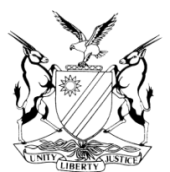REPUBLIC OF NAMIBIA

IN THE HIGH COURT OF NAMIBIA, MAIN DIVISION, WINDHOEK
REVIEW JUDGMENT
Case Title: The State v Namwengyo Hilda Emvula | Case No: CR 2/2020 | |
Division of Court: Main Division | ||
Heard before: Honourable Mr. Justice Unengu AJ et Honourable Ms. Justice Usiku J | Delivered on: 21 January 2020 | |
(HIGH COURT MAIN DIVISION REVIEW REF NO. 1171/2019) | ||
Neutral citation: S v Emvula (CR 2/2020) [2020] NAHCMD 10 (21 January 2020) | ||
The order: 1. The conviction and sentence on both counts are set aside. 2. The matter is referred back to the Rundu magistrate’s court to act in accordance with the provisions of s 75 of the CPA. | ||
Reasons for order: | ||
UNENGU, AJ (USIKU, J concurring): [1] It is a review matter submitted on automatic review in terms of s 302 of the Criminal Procedure Act1 (the CPA) by a magistrate sitting at the Rundu district court. The unrepresented accused person was charged with crimes of forgery and uttering on counts one and two respectively. [2] The allegations in count one, amongst others are that the accused during 2000 upon unknown date at Windhoek in the district of Windhoek defrauded the Ministry of Education by falsifying an International General Certificate of Secondary Education (Grade 12) by grading herself with a D symbol in Development Studies and English Second Language and a C symbol in Biology replacing symbols G, F and E she had obtained in the subjects respectively. [3] With regard to count two, the allegations are, amongst others, that the accused uttered and represented the forged certificate to the then Permanent Secretary of the Ministry of Health causing the Ministry to accept her and enrolling her in a course as a trained Orthopaedic Technician and employed as a Technical Assistant in the Ministry at the Rundu State Hospital with effect from April 2003 until 11 December 2011. [4] The accused pleaded guilty to both counts. He was questioned by the magistrate in terms of s 112(1)(b) of the CPA, found guilty and sentenced to pay a fine of N$ 3000 or 12 months imprisonment on count one; and a fine of N$ 5000 or 2 years imprisonment was imposed on count two. [5] On review, I found the proceedings not to be in accordance with justice considering the jurisdiction where the crimes were committed. According to the allegations set out in the annexures to the charge sheets and the sentences imposed for the crimes. Generally, the two crimes are taken as one for purposes of sentencing. It was not done in this matter though and the alternative imprisonment periods to the fines, in my view, are out of proportion to the fine sentences. [6] In view of the aforesaid, I addressed the following query for the attention of the learned magistrate. 1. The record of proceedings submitted for review is incomplete. Locate the missing part and then resubmit the matter for review. 2. Don’t you think that the alternative periods of imprisonment are disproportionate to the fines? 3. If the crimes were committed in the district of Windhoek, on what legal basis did you assume jurisdiction to hear the matter?’ [7] The magistrate in her response to the query had this to say: ‘1. The missing part has since been located and hereto attached to the case record. 2. It may appear that the alternative periods of imprisonment are disproportionate to the fines but if one looks at the statutory fines especially immigration e.g overstaying, the penalty clause is fine not exceeding N$12 000.00 or three years imprisonment. That fraction would be a fine of N$4000.00 or one year imprisonment. My consideration view is that a fine of N$3000.00 or alternative twelve months imprisonment is not that disproportionate. 3. The court acted in terms of Section 210 Act 51/1977 as amended. The accused consented to jurisdiction which is acceptable in our justice system. The conducts which constituted these two offenses involved many ministries. It would require her to be tried piecemeal, here in Rundu and in Windhoek. But both major ministries are decentralized which to fact could the criminal justice system to institute cases in any of the relevant districts.’
[8] The court will not accept the explanation advanced to justify the sentences imposed, in particular the reference to the penalty clause in the Immigration Control Act for the offence of overstaying. The comparison is misplaced for various reasons one thereof being the crimes the accused convicted of and sentenced for are common law crimes for which the court below has a sentencing jurisdiction for a period of imprisonment not exceeding 5 years and a sentence of a fine not exceeding N$ 20 000. [9] On the question on what legal basis the magistrate assumed jurisdiction to hear the matter in the magistrate court for the district of Rundu while the crimes were committed in Windhoek in the district of Windhoek, the magistrate referred this court to s 210 of the CPA which has nothing to do with territorial jurisdiction. Section 210 provides as follows: ‘210 irrelevant evidence inadmissible No evidence as to any fact, matter or things shall be admissible which is irrelevant to immaterial and which cannot conduce to prove or disprove any point or fact at issue in criminal proceedings.’ [10] That being the case, it is clear that the accused was tried in a court having no jurisdiction to try the matter, therefore, a serious irregularity was committed rendering the whole proceedings conducted before the Rundu magistrate court a nullity. | ||
E P UNENGU ACTING JUDGE | D N USIKU JUDGE | |